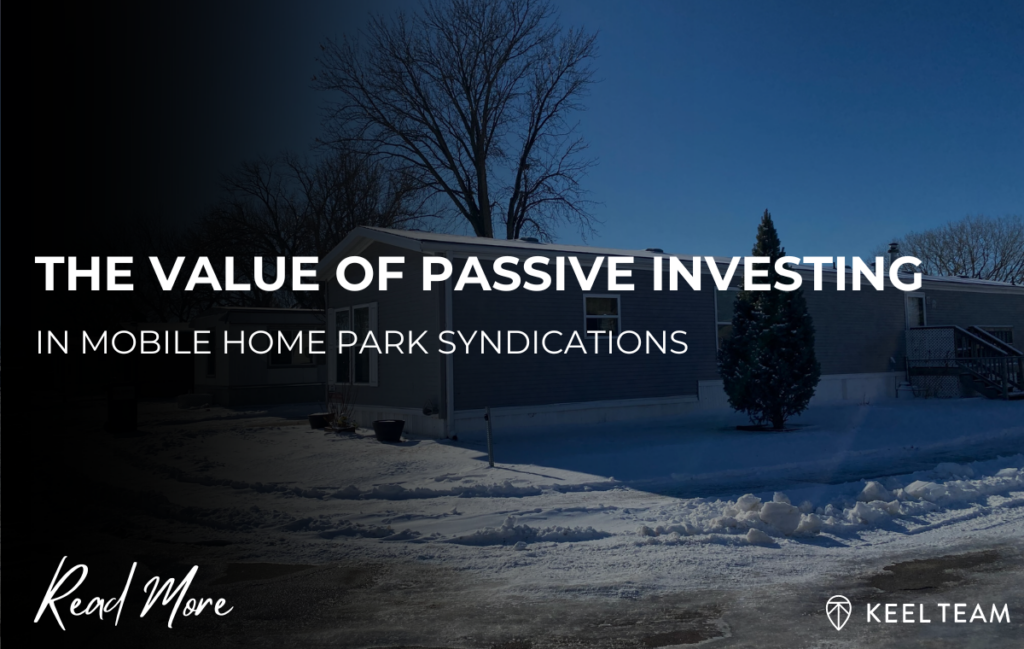The Value of Passive Investing in Mobile Home Park Syndications

Investing in mobile home park syndications can be an effective way to potentially build wealth without the day-to-day responsibilities of property management. For those new to the concept or considering their investment options, here are some key insights and strategies for passive investing in mobile home park syndications.
Understanding Passive Investing
Passive Investing involves putting your money into real estate deals managed by professional syndicators or operators. This could allow you to benefit from real estate investments without actively managing properties. It is considered an attractive option for those who want to diversify their portfolios, earn passive income, and take advantage of real estate’s long-term growth potential.
Benefits of Passive Investing
Time Efficiency
Passive investing frees you from the time-consuming tasks of property management. Consequently, you can potentially enjoy the benefits of real estate ownership, such as rental income and property appreciation, without the hassles of maintenance, tenant management, or property upkeep. This time efficiency is especially valuable for those with demanding careers or personal commitments.
Diversification
Investing in syndications could allow you to diversify your portfolio across different properties and markets. This diversification often reduces risk and improves the stability of your investment returns. By spreading investments across various geographic locations and property types, you typically mitigate the impact of a downturn in any single market.
Professional Management
Syndicators are experienced professionals who manage all aspects of the investment. They handle property acquisition, financing, management, and eventual sale or refinance, allowing you to likely benefit from their expertise and market knowledge. This professional management helps ensure that your investment is handled with a level of proficiency that might be challenging to achieve independently.
Access to Larger Deals
By pooling resources with other investors, you could participate in larger, more lucrative real estate deals that would be difficult to finance individually. These larger deals often have economies of scale that can lead to better returns compared to smaller investments.
Tax Advantages
Mobile home park investments offer several tax benefits, including depreciation and the potential to defer taxes through 1031 exchanges. These advantages could significantly enhance your after-tax returns. Depreciation allows you to deduct a portion of the property’s cost each year, likely reducing your taxable income.
Download our FREE eBook and learn key insights into what you should look out for BEFORE going into a passive mobile home park investment!

Key Strategies for Successful Passive Investing
Evaluate the Operator
Investigating the operator’s history and performance in managing similar properties could prove useful. A strong track record of successful projects could indicate a higher likelihood of future success. Additionally, you should look at the operator’s experience, past performance, and reputation within the industry. Checking references and speaking with other investors who have worked with the operator can provide valuable insights.
Ensuring that the operator provides regular updates and transparent reporting could help with keeping track of your investment and understanding its performance. Regular communication helps you stay informed about the status of the property, any challenges being faced, and the progress of the business plan.
Understand the Business Plan
Focusing on the Net Operating Income (NOI) growth projections of the investment could be beneficial. Consistent NOI growth often indicates effective property management and value creation. The business plan should outline how the operator intends to increase the NOI through various strategies such as increasing rents, reducing expenses, or making property improvements.
While the property market is important, the operator’s business plan and ability to execute it could often be more critical. Evaluating how well the operator understands the market dynamics and the specifics of the property type could be essential. The business plan should include market analysis, property assessment, and a clear strategy for adding value to the property.
Review the Investment Structure
Understanding the preferred return offered to investors is important. This is the return investors receive before the operator takes their share of the profits. A clear and fair preferred return structure could align the interests of the operator and investors. Knowing the details of the preferred return helps you gauge the potential cash flow and overall returns from the investment.
Analyzing where your investment sits in the capital stack might determine the priority of your returns and potential risks. Typically, equity investors take on more risk but also have the potential for higher returns. The capital stack includes debt and equity, with different levels of risk and return associated with each position.
Assess Market Trends
Staying informed about supply and demand trends in the real estate market could be beneficial. For instance, periods of undersupply might lead to higher occupancy rates and rental income, while oversupply could increase competition and lower returns. Understanding these trends helps you evaluate the potential for rental growth and property appreciation.
Monitoring economic indicators such as interest rates, employment rates, and demographic trends might influence the performance of your real estate investments. Changes in these indicators can impact property values, rental demand, and the overall market environment.
Common Mistakes to Avoid
Chasing High Returns Without Due Diligence: High projected returns can be enticing, but they often come with higher risks. Conducting thorough due diligence on the operator, market, and property might ensure the investment is sound. This involves analyzing financial projections, market conditions, and the operator’s track record.
Ignoring Operator Experience: The success of a real estate investment heavily depends on the operator’s expertise and ability to execute the business plan. Not overlooking the importance of a seasoned and reliable operator could be crucial. Experienced operators are more likely to navigate challenges effectively and deliver on their promises.
Overlooking Market Fundamentals: Understanding the local market conditions and trends could be crucial. Investments in growing markets with strong demand and limited supply tend to perform better over time. Market research should include demographic trends, employment growth, and local economic conditions.
Conclusion
Passive investing in mobile home park syndications likely offers a compelling way to grow your wealth while minimizing the hands-on involvement typically associated with property management. By carefully selecting experienced operators, understanding the business plan, and staying informed about market trends, you could potentially maximize your returns and achieve your investment goals. With the right strategies and due diligence, passive mobile home park investing could be a powerful addition to your investment portfolio.
In conclusion, passive investing typically allows you to enjoy the benefits of real estate without the day-to-day responsibilities. As you consider this investment strategy, focus on evaluating operators, understanding business plans, reviewing investment structures, and staying informed about market trends. By avoiding common mistakes and making informed decisions, you can potentially build a robust and profitable real estate portfolio.
Learn more about mobile home park investing.
Interested in learning more about mobile home park investing? Get in touch with us today to find out more.
Disclaimer:
The information provided is for informational purposes only and is not investment advice or a guarantee of any kind. We do not guarantee profitability. Make investment decisions based on your own research and consult registered financial and legal professionals. We are not registered financial or legal professionals and do not provide personalized investment recommendations.
View The Previous or Next Post
Subscribe Below 👇





